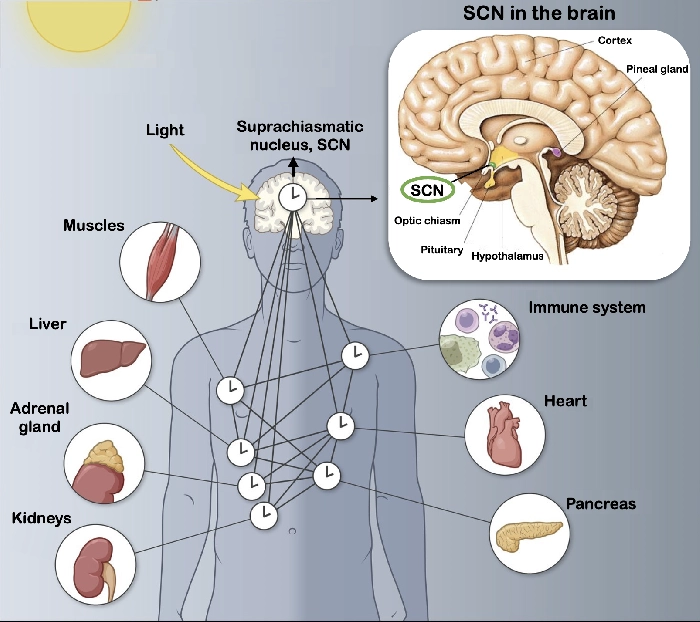Have you ever wondered why you feel sleepy at night, wake up at almost the same time every morning, or get hungry around certain hours of the day—even without checking the time? These daily patterns are not coincidences; they are governed by a powerful internal system called the biological clock. This intricate system regulates many of your body’s functions based on time of day, affecting everything from your sleep cycles and energy levels to digestion and even mood.
The biological clock, often referred to as the circadian rhythm, is your body’s natural timing mechanism. It operates on a 24-hour cycle and is primarily influenced by external cues—especially light and darkness. At the core of this system lies a small group of cells in the brain called the suprachiasmatic nucleus (SCN), located in the hypothalamus. The SCN receives light signals from the eyes and synchronizes the body’s rhythms accordingly, telling various systems when to sleep, eat, and be alert.
Biologically, the clock functions through a feedback loop of genes and proteins that rise and fall in activity over a 24-hour cycle. For example, the hormone melatonin, which induces sleepiness, starts increasing after sunset and peaks during the night. As daylight returns in the morning, melatonin levels drop, allowing the body to wake up naturally. This pattern helps maintain a balance between rest and activity in tune with the environment.
The impact of the biological clock extends far beyond sleep. It influences hormone release, body temperature, blood pressure, metabolic rate, and even immune response. When this internal rhythm is aligned with your daily schedule, your body operates efficiently. But when it’s out of sync—due to factors like jet lag, shift work, or excessive screen exposure—it can lead to a range of problems, including insomnia, fatigue, weight gain, depression, and weakened immunity.
In today’s digital era, this natural system is increasingly under threat. Artificial lighting, late-night screen use, and irregular sleeping patterns are all common disruptions. Blue light emitted from phones and computers at night suppresses melatonin production, delaying sleep and degrading sleep quality. As a result, experts recommend minimizing screen time before bed and creating a dark, quiet environment to support your biological rhythms.
Understanding your biological clock is the first step toward improving your lifestyle. When you live in harmony with this internal system, you can sleep better, think more clearly, boost your energy, and protect your long-term health. In the rest of this article, we’ll explore how the biological clock works, how it affects different aspects of your health, and what practical steps you can take to reset and maintain its balance.
How the Biological Clock Works
The biological clock is a complex system embedded within our brain, synchronized by external signals—primarily light. At the heart of this system is the suprachiasmatic nucleus (SCN), a cluster of approximately 20,000 neurons located in the hypothalamus. These neurons receive light information directly from the eyes and use it to regulate physiological and behavioral patterns throughout the body.
When morning light enters the retina, it triggers the SCN to signal a reduction in melatonin, the hormone responsible for sleepiness. This shift wakes you up and prompts alertness. In the evening, as darkness sets in, melatonin production increases, preparing the body for sleep. This light-dark cycle forms the foundation of your circadian rhythm.

Biological Clock and Body Functions
The biological clock influences nearly every system in the human body. Hormonal secretions, cardiovascular efficiency, metabolism, and immune function all follow daily cycles regulated by the clock. Cortisol, for instance—our natural “stress hormone”—peaks in the early morning to help us wake up and gradually decreases throughout the day.
Body temperature also follows a rhythmic cycle, rising in the late afternoon and dropping before bedtime, promoting restful sleep. Digestive enzymes follow a timed rhythm as well, which explains why digestion can become sluggish if meals are taken at irregular times.
Consequences of a Disrupted Biological Clock
When your biological clock is thrown off balance—due to jet lag, night shifts, or irregular sleep—it can trigger a cascade of health issues. Disruptions can desynchronize hormone cycles, interfere with digestion, reduce cognitive performance, and increase susceptibility to illness.
Common problems associated with circadian misalignment include:
- Insomnia: Difficulty falling or staying asleep, often due to late-night screen exposure or irregular bedtime routines.
- Jet lag: A temporary misalignment of the biological clock due to rapid travel across time zones.
- Mood disorders: Depression and anxiety are more common among shift workers and those with poor sleep hygiene.
- Weight gain and metabolic issues: Eating late at night or not getting enough sleep can affect insulin sensitivity and lead to obesity or type 2 diabetes.

The Role of Sleep in Maintaining Rhythm
Sleep plays a central role in stabilizing the biological clock. The average adult needs between 7 and 9 hours of sleep per night to maintain proper function. When sleep is insufficient or poorly timed, the body fails to reset properly, causing a breakdown in hormonal and neurological rhythms.
Studies show that a consistent sleep schedule, combined with adequate exposure to morning sunlight, can drastically improve sleep quality, energy levels, and mental focus. Napping for short periods during the day may be helpful, but long or late naps can confuse your internal timing system.
Practical Tips for Resetting Your Biological Clock
If your biological clock feels off, here are some science-backed strategies to reset it:
- Get morning sunlight: Exposure to daylight within the first hour of waking helps realign your clock with the natural day.
- Stick to a sleep schedule: Go to bed and wake up at the same time—even on weekends—to reinforce your rhythm.
- Limit blue light at night: Avoid screens at least an hour before bed. Use night mode filters or blue-light blocking glasses if necessary.
- Avoid caffeine in the afternoon: Caffeine blocks melatonin production and can delay your sleep cycle.
- Eat meals at regular times: Erratic eating patterns can confuse your internal timing for digestion and metabolism.

Living in Harmony with Your Biological Clock
Modern life makes it easy to ignore our internal rhythms. Artificial lighting, late-night work, and digital distractions often push us into schedules that contradict our natural programming. Over time, this misalignment affects more than just sleep—it can impact emotional resilience, productivity, and long-term well-being.
The good news is that your biological clock can be retrained. With small adjustments to your lifestyle and environment, you can reestablish a rhythm that supports your mental clarity, physical health, and emotional balance. Being mindful of light exposure, meal timing, and sleep hygiene can make a profound difference.
In understanding the biological clock, we unlock one of the most powerful tools for improving health, productivity, and quality of life. Far more than just a sleep regulator, this internal system orchestrates a wide range of bodily functions—from hormone production to immune defense—based on time cues like light, darkness, and routine. When we honor this natural rhythm, our bodies reward us with better rest, clearer thinking, improved digestion, and emotional stability.
However, in a modern world filled with artificial light, irregular work hours, late-night entertainment, and digital devices, it’s easy to fall out of sync with our internal clock. This disconnect is not harmless. Studies link chronic circadian disruption with a variety of serious health issues: obesity, heart disease, type 2 diabetes, depression, and even certain cancers. These risks underscore the importance of taking practical, preventive steps to realign with nature’s cycles.
What’s promising is that the biological clock is highly adaptable. With intention and consistency, you can reset it. Returning to a natural rhythm doesn’t require drastic lifestyle changes. It starts with simple habits: waking up with sunlight, avoiding screens before bed, eating at the same times each day, and respecting your body’s natural need for rest.
In recent years, the field of chronobiology—science dedicated to studying biological timing—has advanced dramatically. Researchers are discovering how medication timing (chronotherapy), meal schedules (chrono-nutrition), and activity cycles (chrono-exercise) can all be optimized to match individual circadian profiles. This emerging field suggests a future where healthcare and wellness are not only personalized, but also timed for maximal effectiveness.
Educational institutions and workplaces are also beginning to recognize the importance of the biological clock. Flexible schedules, natural lighting in offices, and later school start times are just some of the adjustments that can enhance productivity and wellbeing. At a personal level, adopting circadian-friendly habits can help reduce burnout, manage stress, and even slow the aging process.
Ultimately, living in sync with your biological clock is a commitment to self-awareness. It’s about listening to your body, honoring its signals, and resisting the urge to override its rhythm for the sake of convenience or routine. The rewards are well worth the effort: deeper sleep, better mood, stronger immunity, and a sustainable path to long-term health.
As our understanding of time’s role in biology continues to grow, so too does our ability to harness it for wellness. The biological clock is not a relic of our primitive past; it’s a sophisticated internal compass that, when followed, can lead us to a healthier, more balanced life. In a world constantly pushing us to move faster and do more, this quiet rhythm is a reminder that timing is everything—and sometimes, slowing down is the smartest move we can make.
Outbound Link Suggestion:
https://www.sleepfoundation.org/
(A trusted source that discusses circadian rhythm)
Healthy Fruit Desserts: Delicious and Nutritious Ideas

